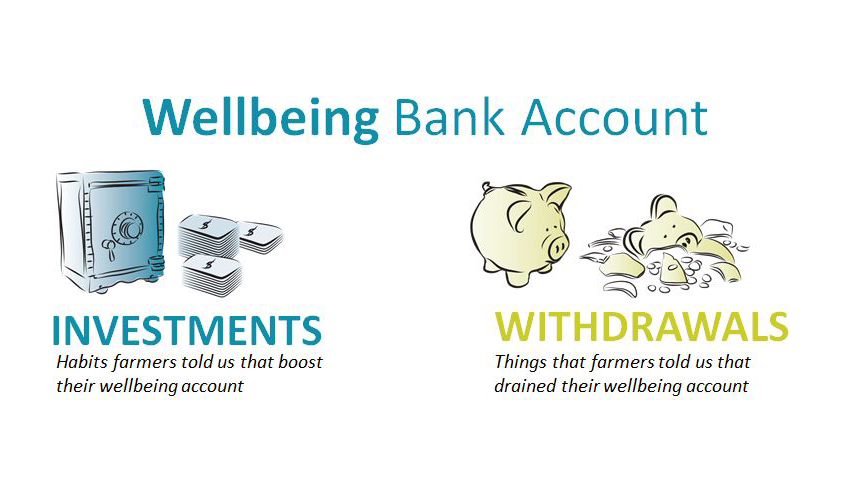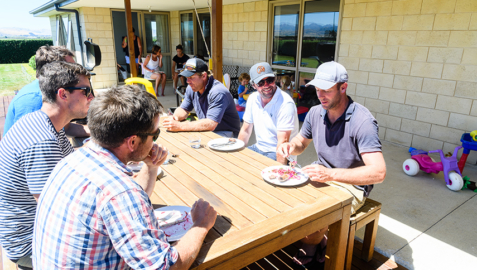
The wellbeing bank account
Module Overview
Wellbeing simply means that you feel pretty happy about how life is going, that life is good! Hugh Norriss, Farmstrong’s wellbeing advisor shares some top tips on how to look after your wellbeing, particularly when coming out of a really busy time on farm.
The importance of locking in wellbeing habits
There are lots of things we can do, or happen to us, that boost this feeling of wellbeing. There are other things that make life feel relentlessly hard and difficult. There are still other situations that do a bit of both.
The ups and downs of farming means that you can’t take your wellbeing for granted. One way of thinking about your wellbeing is like investments in a bank account. If you invest wisely and often, even with little amounts, you get big dividends over time.
As we experience stressful situations and knock-backs in life, our natural supply of wellbeing can get depleted. Think of these like withdrawals from your wellbeing account. If this continues for too long, we start to head towards an ‘overdraft’ situation that could be burnout and depression along with feelings of guilt, shame, despair and hopelessness.
It can be very hard to climb out of this pit once we slide into it. We will need help from others, friends and family, recovery time to get back to normal and professional help such as therapy and counselling. So it’s best to do everything we can to avoid this situation by learning and locking in our wellbeing habits when we are doing well, feeling positive and energetic.
If we wait until we are burnt out or depressed before we think about our wellbeing, we will barely be able to get out of bed at that point, let alone learn new skills. To go back to the bank account analogy, the best time to invest is when you have some spare cash.
Common withdrawals on your wellbeing
Farmers have told us that the following situations make a dent in their wellbeing, that is a withdrawal from their wellbeing bank account:
- Having too much to do, all of the time
- Lack of sleep
- Relentless compliance obligations
- Not getting time off the farm
- Staffing problems
- Succession worries
- Financial uncertainty.
These situations lead to negative emotions like frustration, anxiety, anger, guilt and feeling overwhelmed, which after a while put a strain on our wellbeing.
What you can do to invest in your wellbeing
So, how can we offset these inevitable wellbeing withdrawals with wellbeing investments?
The first step is to do what we can to reduce any unnecessary stress from our business and personal life. We can do this by:
- Identifying risks and planning for them
- Prioritising work tasks
- Not over committing
- Minimising contact with very negative people
- Being well organised.
In addition the following are well supported by research as ways to boost your wellbeing.
Healthy thinking
Its easy to think that we need something in the world to come right before we regain some wellbeing. But often the biggest benefits can come from changing how we interpret situations. This is about learning healthy thinking that includes being able to reframe situations, challenging unhelpful beliefs, getting things in perspective and thinking flexibly. See our Farmstrong healthy thinking advice for tips on how to do this.
Not comparing
Measuring success on your own terms and personal goals. Not getting caught up in social comparison with neighbours, friends or family, or on social media
Small habits
Go for small regular wellbeing habits rather than create grand plans. The five ways to wellbeing are small things that are easy, low or no cost, and science based. They are like your ‘five a day’ fruit and vegetables, but more for the mind. Grand plans like doing an ironman can be good for some but risk being too hard for many. Also, they are often a one off. The better approach is building small lifetime wellbeing habits. The five ways to wellbeing are.
- Be active – anything that gets you moving is good.
- Give – small acts of kindness and generosity throughout the day.
- Keep learning – being curious and learning new things throughout the day.
- Connect – being around positive people and sharing experiences.
- Take notice – taking a few moments throughout the day to be grateful for what you have and savour enjoyable moments.
Quality sleep
Aim for a lifestyle, attitudes and thinking habits that support better sleep. Good quality sleep is an amazing wonder-drug to restore your wellbeing to positive every morning. Refer to Farmstrongs sleep advice on tips on how to do this.
Relaxation techniques
Learning these can help reset your body to a state of wellness during busy times.
Clarify your purpose
A strong positive sense of purpose gives you the drive to get through setbacks.
Make it social
Sharing your wellbeing habits with others will make it much easier to start and maintain them. There are many great examples of farmers sharing their wellbeing stories on the Farmstrong website.
Put wellbeing habits into practice
If your wellbeing habits are set up and locked in, then even if life deals up situations that put you into wellbeing overdraft, you will have habits in place to get you back to feeling better more quickly.
I’ve found that as I learn these wellbeing habits, its good to practice them in response to some smaller setbacks in life, like an upsetting argument, an embarrassing mistake or a busy period. This way I can practice and test them out in preparation for bigger problems that might come around.
The long term benefits of wellbeing
Last but not least there is the wellbeing interest payment. Scientific studies show that people with higher levels of wellbeing are more productive, sociable, physically healthy and successful. So, you get long-term benefits by boosting your wellbeing, regardless.
So, having a healthy wellbeing bank account is a definite win-win situation. It reduces risk of mental ill health and gives business and social benefits at the same time.
In a busy occupation like farming it’s easy to put off your own wellbeing because so much needs to get done. But this is a false economy in the long run, as you are neglecting the most important asset on the farm, you.
In summary
- Our natural supply of wellbeing can get depleted as we deal with stressful life situations.
- If it gets too depleted, we go into overdraft and become mentally unwell.
- But we can keep topping up our wellbeing with good science-based habits.
- The time to learn these habits is when our wellbeing is strong, not waiting until it is depleted.
- Investing regularly in our wellbeing means we can enjoy the productivity, health and social benefits that come from having a healthy wellbeing bank account.


